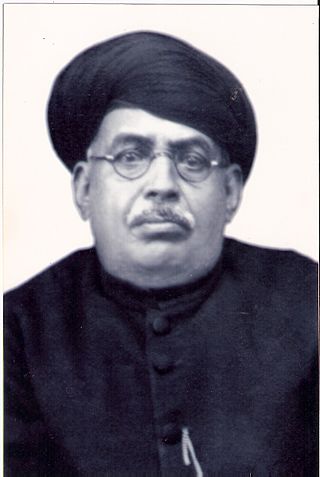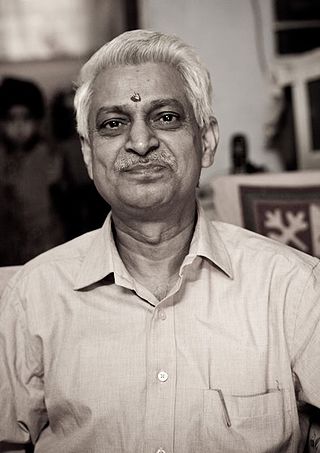
Gaurishankar Hirachand Ojha, born in Rohida village of Sirohi District, was a historian from the Indian state of Rajasthan. A prolific author, he wrote several books on the history of Rajasthan and other historical subjects. Subsequent historians from Rajasthan have referred to him as Guruvara Mahamahopadhyaya. Ojha regarded Kaviraj Shyamaldas as his guru and worked under him as assistant secretary of the historical department, Udaipur

Govind Chandra Pande was a well-known Indian scholar, philosopher and historian of the Vedic and the Buddhist periods. He served as professor of ancient history and vice-chancellor at Jaipur and Allahabad universities. He was also the chairman of the Indian Institute of Advanced Study, Simla for several years, the Chairman of Allahabad Museum Society and the Chairman of Central Tibetan Society, Sarnath Varanasi.

Satya Vrat Shastri was an Indian Sanskrit scholar, writer, grammarian and poet. He wrote three Mahakavyas, three Khandakavyas, one Prabandhakavyas and one Patrakavya and five works in critical writing in Sanskrit. His important works are Ramakirtimahakavyam, Brahattaram Bharatam, Sribodhisattvacharitam, Vaidika Vyakarana, Sarmanyadesah Sutram Vibhati, and "Discovery of Sanskrit Treasures" in seven volumes.
Shastri or Shastry is a Brahmin surname. The word shastri translates to 'scholar'. It is derived from Sanskrit and means one who is proficient in the Shastras. Notable people with the surname include:

Bhagirath Prasad Tripathi, better known as Vagish Shastri, was an Indian Sanskrit grammarian, linguist, tantra and yogi. In 2018, Government of India awarded him the fourth highest civilian award Padma Shri for his work in the field of literature and education.

Rewa Prasad Dwivedi was a Sanskrit scholar, poet, writer, teacher, and critic. His original works include poetry as epics and lyrics, plays, and prose. He wrote the new literature under the pseudonym "sanatana", meaning 'the eternal'. He is also known as 'Acharya' Dwivedi.
Saubhagya Singh Shekhawat was an Indian Rajasthani language writer.

Jagadguru Ramanandacharya Swami Rambhadracharya is a Hindu religious leader, Sanskrit scholar and Katha artist based in Chitrakoot, India. Rambhadracharya is a spontaneous poet and writer in Sanskrit, Hindi, Awadhi, Maithili, and several other languages. He has authored more than 100 books and 50 papers, including four epic poems, a Hindi commentary on Tulsidas' Ramcharitmanas, a Sanskrit commentary in verse on the Ashtadhyayi, and Sanskrit commentaries on the Prasthanatrayi scriptures. He is regarded as one of the greatest authorities on Tulsidas in India, and is the editor of a critical edition of the Ramcharitmanas.
Veeranarayana N. K. Pandurangi is a Sanskrit scholar from Bangalore, worked in Jaipur, Rajasthan and at present he is the Principal of Karnataka Samskrit University's evening college. He was awarded the Maharshi Badrayan Vyas Award for Sanskrit by Pratibha Patil, the then President of India, for the year 2011. He is currently Professor and the Dean at the Department of Darshana, at the Jagadguru Ramanadacharya Rajasthan Sanskrit University, Jaipur. Pandurangi is a specialist in Darshan.

Bhatt Mathuranath Shastri was an eminent Indian Sanskrit scholar, poet, philosopher, grammarian, polyglot and expert of Tantra from Jaipur, Rajasthan. He was one of the prominent Sanskrit writers of the twentieth century who wrote on both traditional and modern themes. He pioneered the use of several new genres in Sanskrit literature, writing radio plays, essays, travelogues, and short stories. He wrote many songs in Sanskrit including Ghazals, Thumris, Dadras and Dhrupads. He pioneered the use of Prakrit metres in Sanskrit poetry.
Girija Shankar Sharma is a historian and scholar of Rajasthani as well as Hindi language literature. He received a Master of Arts (M.A.) in History from Dungar College and a Doctor of Philosophy (Ph.D.) from the University of Rajasthan, Jaipur. He joined the Rajasthan State Archives (Bikaner) in 1963 and retired as deputy director of the Archives in 1996.
Divakar Sharma is an Indian scholar of Sanskrit, Hindi and Rajasthani languages.
Keshab Chandra Dash, is a scholar and author from Odisha.

Pundit Devarshi Ramanath Shastri was a Sanskrit poet, scholar and commentator on Pushtimarg and Shuddhadvaita Vedanta, the philosophical school of pure non-dualism propounded by Shri Vallabhacharya (1479-1531). He was born in 1878 in Jaipur, Rajasthan in a renowned Vellanadu Brahmin family of Sanskrit scholars belonging to the Taittariya branch of Krishna Yajurveda, who migrated from Andhra Pradesh to North India in the 15th century AD and to Jaipur in the 18th century with his famous ancestor Kavikalanidhi Devarshi Shrikrishna Bhatt having been invited by Sawai Jai Singh II. His father’s name was Shri Dwarakanath Bhatt and mother’s name was Shrimati Janaki Devi. His only son was Devarshi Brajnath Shastri (1901-1954), who was also a scholar of Shuddhadvaita. He was the elder brother of epoch-making Sanskrit poet and scholar Bhatt Mathuranath Shastri. He wrote extensively in Hindi, Sanskrit and Brajbhasha languages.
Kavikalanidhi Devarshi Shrikrishna Bhatt (1675–1761), a contemporary of Maharaja Sawai Jai Singh II of Jaipur, was an 18th-century Sanskrit poet, historian, scholar, and grammarian. He was an immensely accomplished and venerated poet of Sanskrit and Brajbhasha at the courts of the Kings of Bundi and Jaipur. He belonged to a reputed Sanskrit family of Vellanadu Brahmins from Andhra Pradesh in South India who migrated to North India in the 15th century on invitation from various erstwhile princely States. His father's name was Laxman Bhatt.

Arknath Chaudhary is an Indian scholar of Sanskrit. He served Central Sanskrit University as Director and Shree Somnath Sanskrit University, Veraval, Gujarat as Vice-Chancellor.

Shivanand Goswami| Shiromani Bhatt .(estimated period: Samvat 1710–1797) was a poet and a scholar of Literature, Poetics, Ayurveda, Orientology, Veda-Vedang, Ritualism, Theology, Astronomy, Astrology, Sanskrit Grammar and a practitioner of Tantra-Mantra etc.
Thakur Akshay Singh Ratnu was a Rajasthani, Brajbhasha and Hindi poet from Rajasthan. His penned poems criticising the British policies of divide & rule. He is considered as one of the modern traditionalist poets. He was a scholar of Hindi, Rajasthani, Dingal(Old Rajasthani), Urdu, Sanskrit and Prakrit. He has been awarded with epithets of 'Sahitya Bhushan', 'Sahitya Ratna', and 'Kavi Ratna'.










